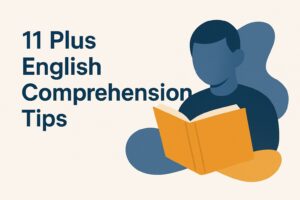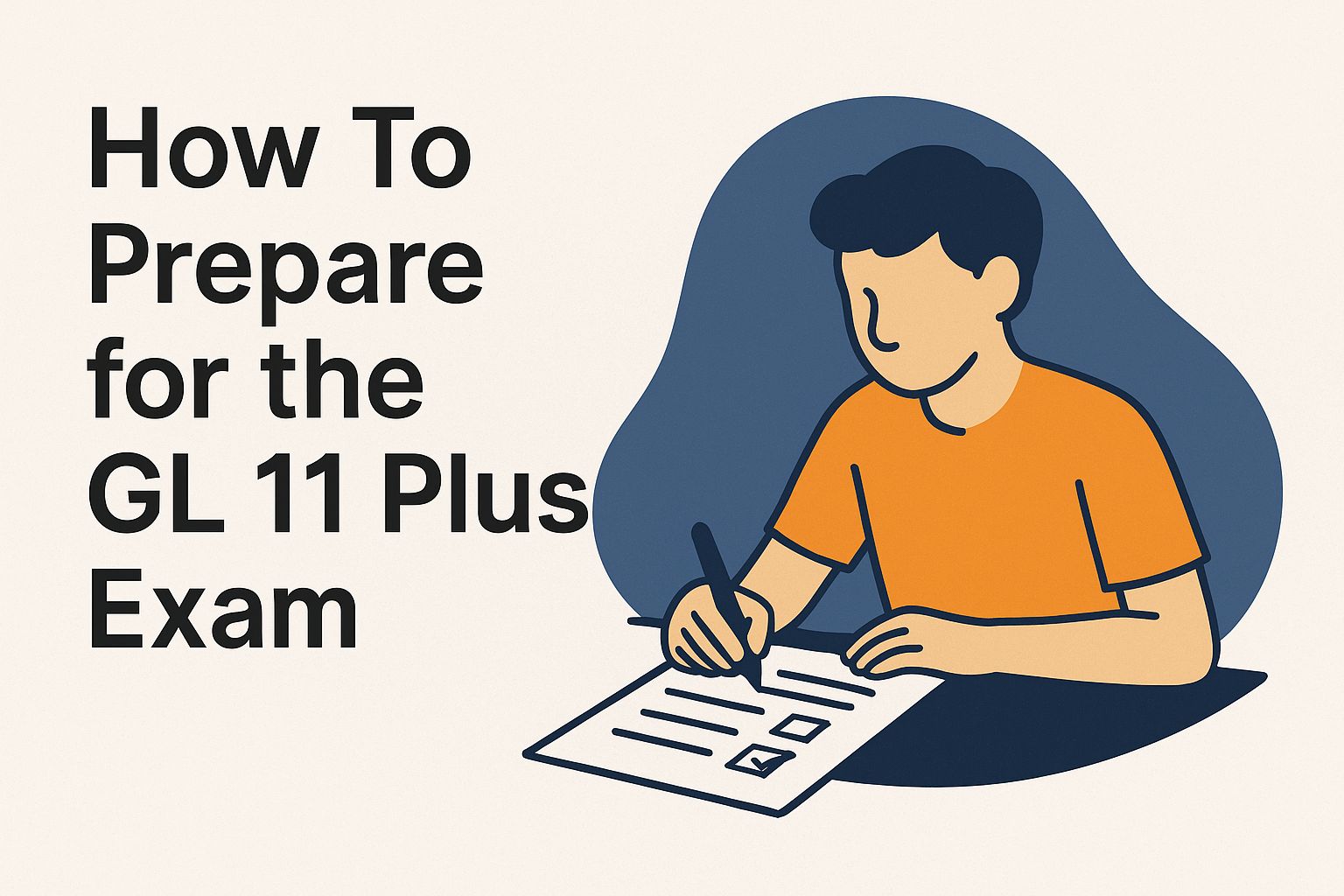
How To Prepare for the GL 11 Plus Exam
The countdown to the GL 11 Plus Exam is on, and feeling a bit overwhelmed is completely normal! This crucial test can shape your child’s educational journey, making preparation nothing short of essential.
From understanding the exam format to creating an effective study schedule, we’ll explore key tips and resources to set your young scholar up for success. Stick around to discover strategies that can make all the difference on that all-important test day!
What is the GL 11 Plus Exam?
The GL 11 Plus Exam evaluates students’ skills in areas such as mathematics, English, verbal reasoning, and non-verbal reasoning through a series of structured questions. This exam is primarily designed for students aged 10 to 11 and serves as a gateway to selective secondary schools. It assesses various components, including numerical problem-solving, comprehension abilities, and logic puzzles.
To prepare effectively, students can utilise a range of resources, such as:
Practice papers from GL Assessment
Online platforms like CGP or IXL that offer interactive exercises
Joining study groups to benefit from peer support
Consistent practice in these subjects will not only enhance students’ confidence but also improve their overall performance.
Importance of the GL 11 Plus Exam
Success in the GL 11 Plus Exam can have a profound impact on a student’s academic journey, as it plays a crucial role in gaining admission to selective secondary schools. Achieving a strong score can pave the way to prestigious institutions, often leading to enhanced educational opportunities, including scholarships and specialised programmes.
For instance, schools like King’s College School prioritise not only academic excellence but also the development of talents in areas such as music, art, and sport. Additionally, competitive exams like the Common Entrance Tests for independent schools can assist students in securing placements in top secondary schools.
It is advisable for parents to begin preparations early, considering resources such as targeted tutoring and practice tests to help boost their child’s confidence and skills.
Understanding the Exam Format
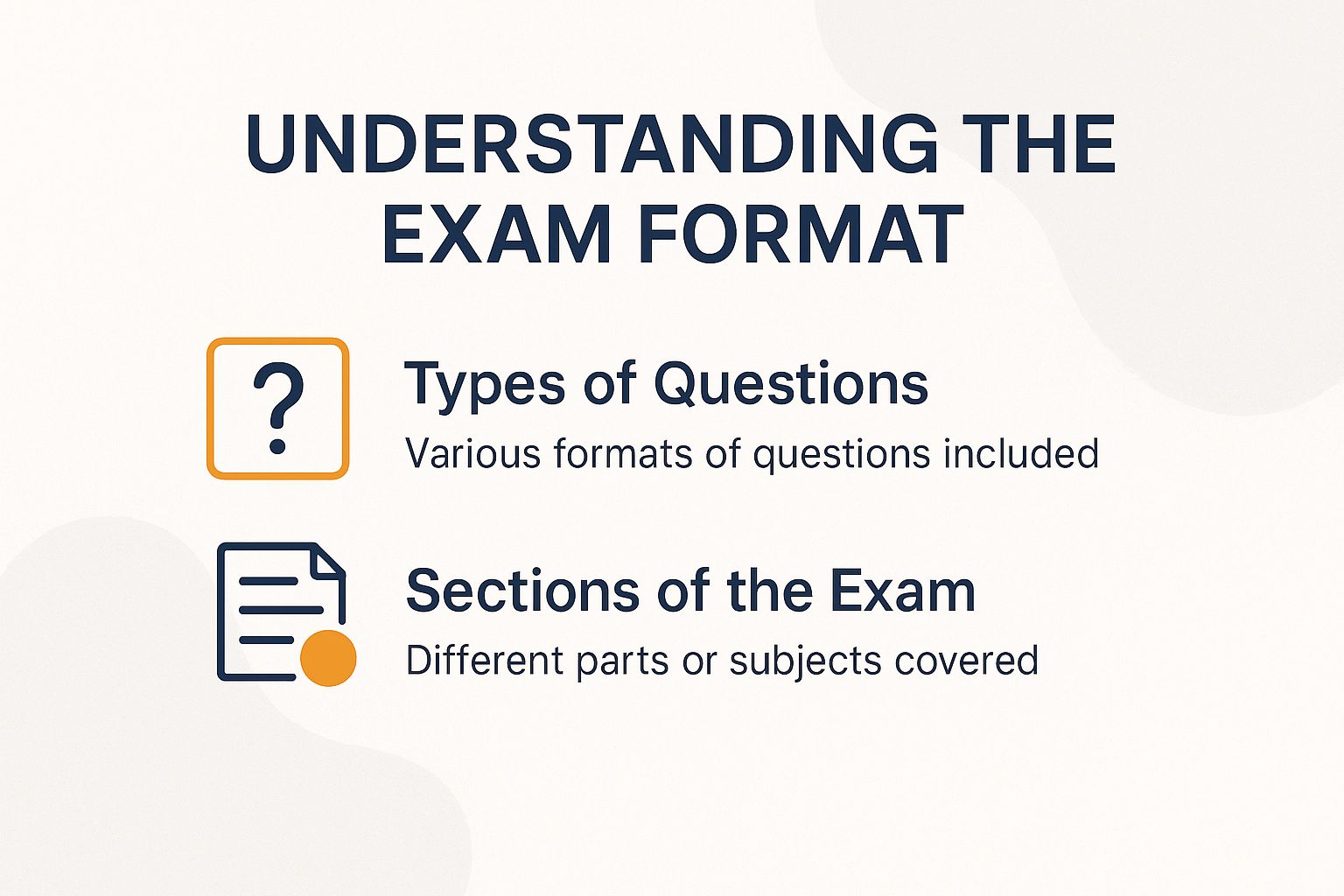
Understanding the format of the GL 11 Plus Exam is essential for effective preparation. This exam features a variety of question types and sections, each designed to assess different skills. To further enhance preparation, it’s useful to know when exactly these exams take place (our parent’s guide to exam dates provides detailed insights).
Familiarising oneself with these elements can greatly enhance the overall readiness for the test.
Types of Questions
The GL 11 Plus Exam encompasses a variety of question types, including multiple-choice, standard format, and problem-solving questions across several subjects. Understanding the structure of these questions is essential for effective preparation.
For instance, multiple-choice questions directly assess knowledge by asking students to select the correct option from four possible answers.
Standard format questions typically require written responses, which evaluate a student’s ability to articulate their understanding effectively. Problem-solving questions, especially in mathematics, challenge students to apply concepts to real-world scenarios.
Utilising resources such as past exam papers and online practice tests can significantly enhance familiarity with these formats. This approach not only boosts confidence but also better equips students for the exam.
Sections of the Exam
The GL 11 Plus Exam is organised into specific sections, each targeting essential academic skills: mathematics, English, verbal reasoning, and non-verbal reasoning. Each of these sections contributes differently to the overall score.
The mathematics section assesses arithmetic and problem-solving abilities, typically accounting for 25% of the total marks.
The English section evaluates comprehension and vocabulary, also contributing around 25%.
Verbal reasoning measures one’s capacity to understand and analyse written information, making up another 25% of the score.
Non-verbal reasoning focuses on patterns and logical reasoning, comprising the final 25%.
For effective preparation, students should allocate their study time according to these weightings. Utilising resources such as past papers and timed quizzes can help track their progress and improve their performance in each area.
Setting a Study Schedule
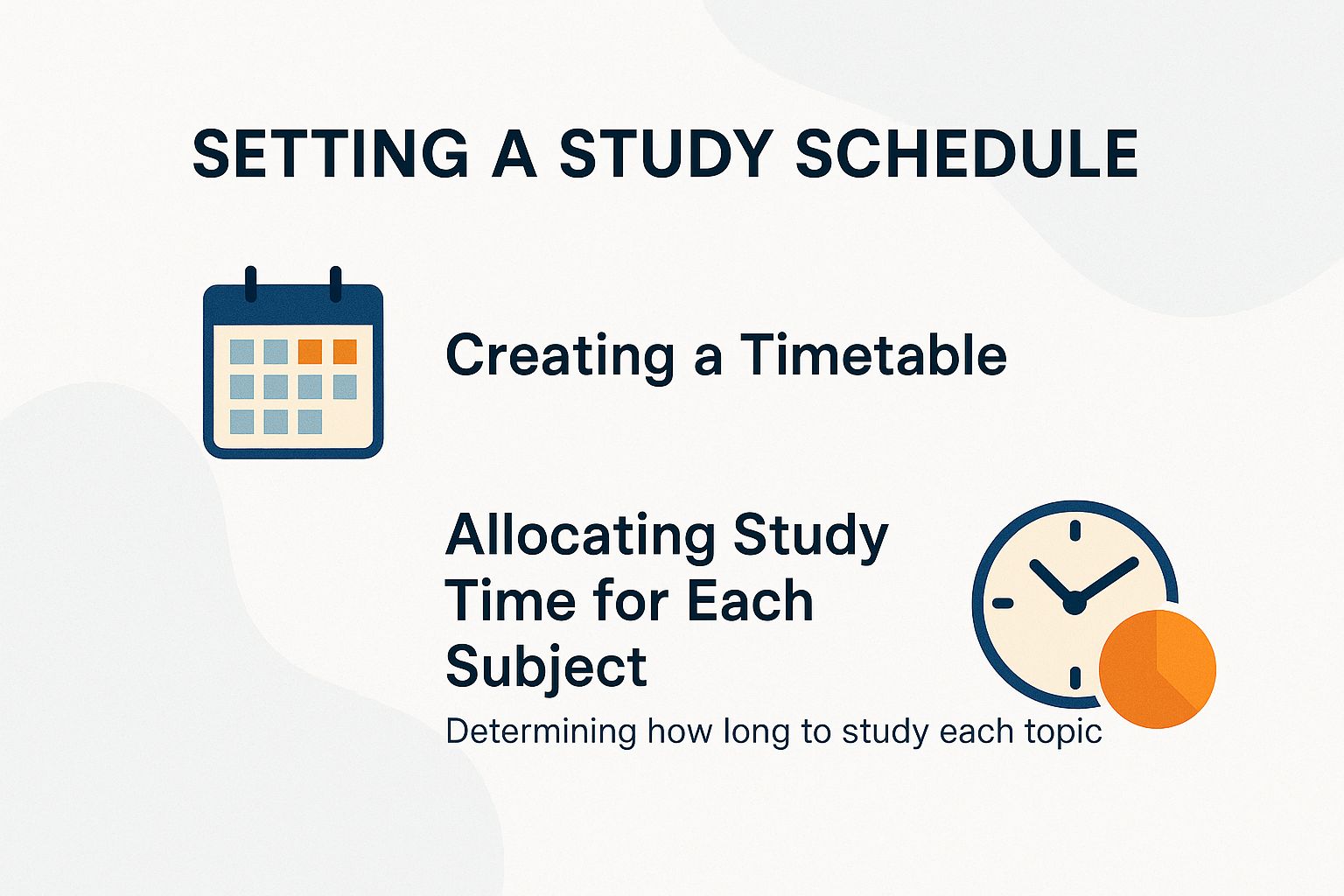
A well-structured study timetable is crucial for preparing for the GL 11 Plus Exam. It helps ensure that all subjects are covered comprehensively while also facilitating effective time management. To craft an effective schedule, you can delve into our 11+ weekly study timetable guide that offers strategies for planning efficient revision sessions at home.
Creating a Timetable
Creating a timetable begins with assessing the total available study time and allocating specific periods for each subject based on their importance and difficulty.
Start by identifying your weekly commitments, such as classes and work hours, and consider using a tool like Google Calendar to keep everything organised. It’s a good idea to block out these times first.
Next, categorise your subjects into three levels: high, medium, and low priority, depending on upcoming exams or project deadlines.
For example, if maths presents the greatest challenge for you, it would be wise to allocate longer study sessions during your peak focus hours. Aim for daily two-hour slots for more difficult subjects, while reserving shorter review periods for those that are easier.
Remember to adjust your timetable as needed based on your progress, allowing for some flexibility in your approach.
Allocating Study Time for Each Subject
Students should allocate their study time based on their strengths and weaknesses in various subjects, ensuring that at least 60% of their study time is spent on the areas that pose the greatest challenges.
To accomplish this effectively, it is important to first identify the subjects where one struggles the most. For example, if mathematics and science are particularly difficult, it would be wise to dedicate two hours each week solely to practising mathematics, utilising online resources such as Khan Academy or Mathway for support.
For science, consider allocating 1.5 hours for reading textbooks and completing revision questions. Keeping a study log can be very beneficial in this process, as it allows students to track their hours and monitor their progress.
This approach not only helps pinpoint areas that require additional focus but also fosters accountability and motivation throughout the learning journey.
Resources for Preparation
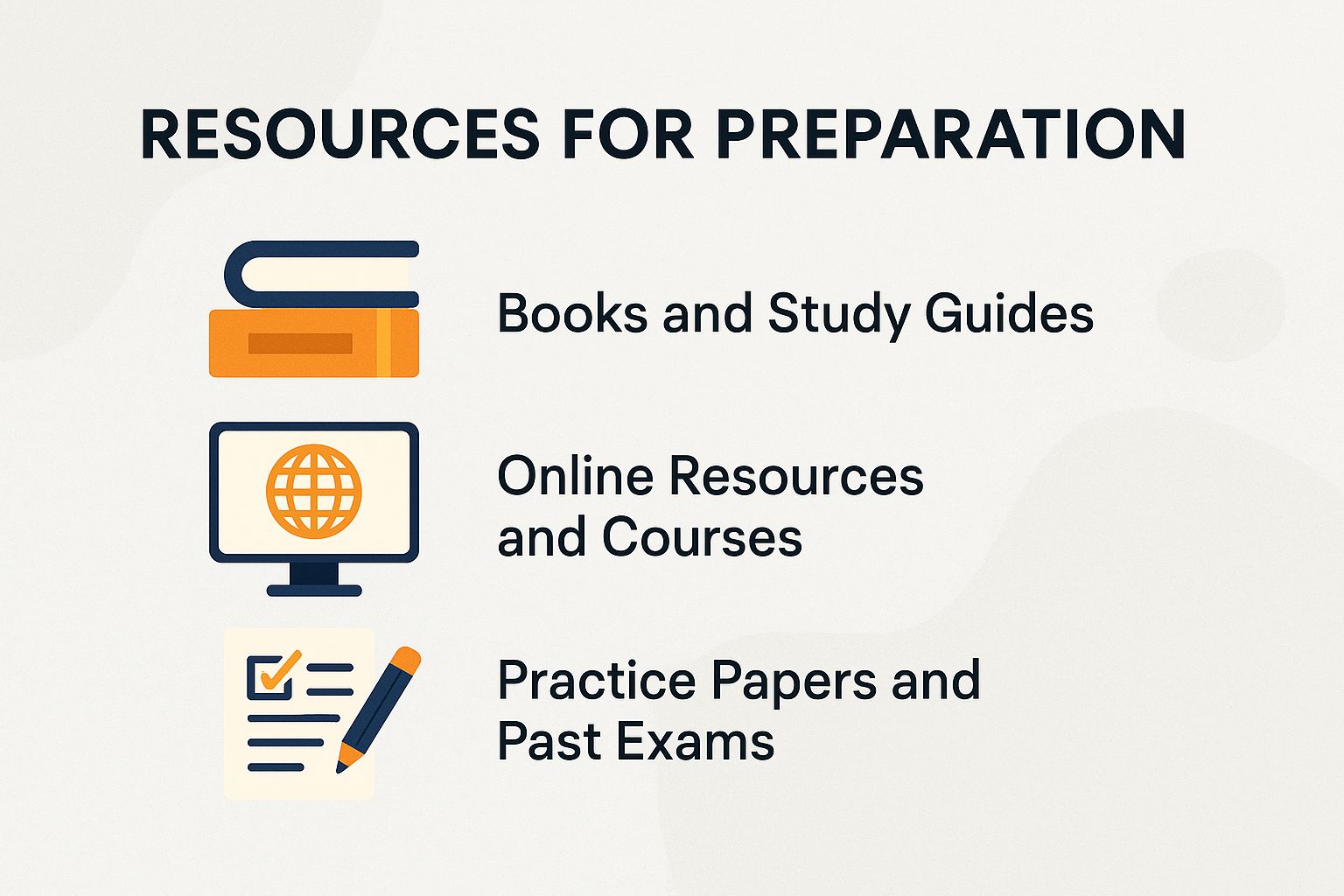
Utilising high-quality resources is essential for success in the GL 11 Plus Exam. This includes a range of materials such as books, online courses, and practice papers that are specifically designed for this assessment. As mentioned, understanding the format is also crucial, which can be explored further in our detailed guide on the format of the 11 Plus Exam.
Books and Study Guides
Popular study guides for the GL 11 Plus Exam include titles such as “GL Assessment 11+ Practice Papers” and “Bond 11+ Maths and English”, which offer targeted practice opportunities.
Another excellent resource is the “CGP 11+ Study Guide”, priced around £12. This comprehensive book encompasses a variety of topics, including verbal reasoning and non-verbal reasoning, specifically designed to strengthen areas where students may feel less confident.
In addition, “Practice Tests for 11+ with Answers” by Scholastic, typically available for around £15, provides valuable practice questions along with detailed solutions, helping students become familiar with the exam format.
Utilising a combination of these resources enables students to achieve well-rounded preparation, ultimately enhancing both their confidence and performance on the exam.
Online Resources and Courses
Websites such as CGP Books and Exam Ninja present a wealth of online courses and resources designed to assist with GL 11 Plus preparation, often featuring interactive quizzes to enhance the learning experience.
These platforms offer a diverse array of study materials, including practice papers, video tutorials, and tools for tracking progress. For example, CGP Books provides affordable study guides starting at £5, whilst Exam Ninja operates on a subscription model priced at £29 per month, which gives users access to a variety of resources tailored for a thorough educational experience.
To further improve your preparation, it would be beneficial to schedule regular practice tests and make use of the interactive quizzes available on these sites to monitor your progress. Engaging with these resources can significantly increase your confidence and readiness for the GL 11 Plus exams.
Practice Papers and Past Exams
Accessing practice papers, such as those available on the GL Assessment website, offers valuable insights into the exam format and question styles.
There are additional resources for practice papers, including the Exam Papers Online platform, where you can find a variety of subjects and levels for a fee of approximately £10.
The Past Papers Archive is another excellent resource, providing free access to a wide range of past exam questions.
Utilising these papers under timed conditions is essential for developing effective exam strategies and managing any anxiety. It would be beneficial to dedicate specific practice sessions each week, focusing on different subjects to build both confidence and proficiency.
Effective Study Techniques
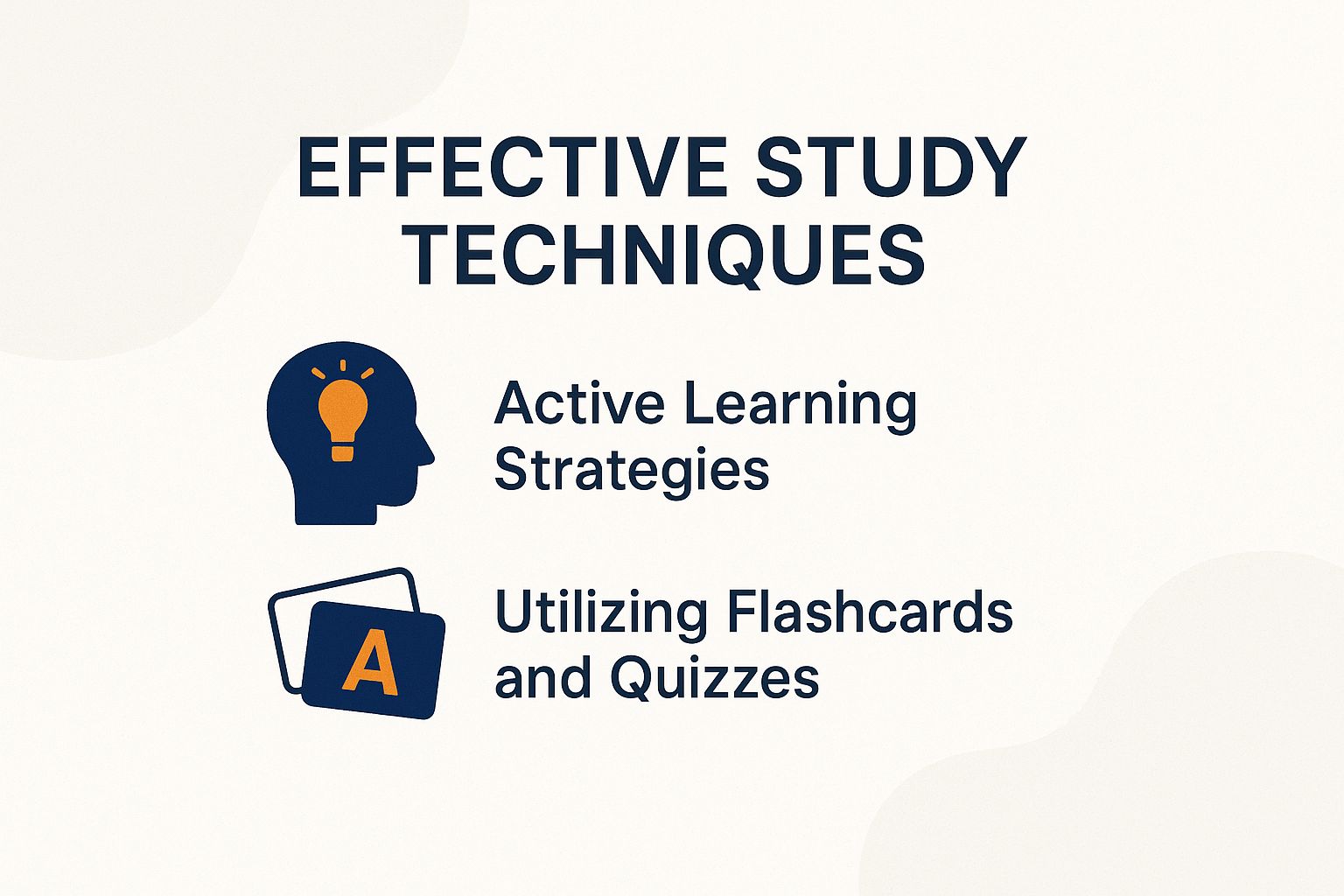
Utilising effective study techniques can significantly improve retention and understanding. This gives the power to students to approach the GL 11 Plus Exam with both confidence and a solid foundation of knowledge.
Active Learning Strategies
Active learning strategies, such as summarising information and teaching concepts to others, can significantly enhance comprehension and retention for GL 11 Plus subjects. To further enrich your learning experience, consider incorporating techniques like spaced repetition and practice quizzes.
For instance, tools such as Anki can effectively schedule review sessions, allowing you to revisit material at optimal intervals. Another effective method is to teach a concept to a peer. This approach not only reinforces your understanding but also highlights any gaps in your knowledge.
Additionally, utilising resources like Quizlet to create flashcards or participating in group study sessions can foster a collaborative environment. This interaction encourages discussion and promotes deeper engagement with the material.
Utilising Flashcards and Quizzes
Utilising flashcards and quizzes can significantly enhance memory retention, with research indicating a 20% increase in recall when spaced repetition techniques are applied. To optimise your learning experience with flashcards, tools such as Anki or Quizlet can be quite beneficial for creating your decks. It is advisable to organise your flashcards thematically, as this approach helps to contextualise the information.
When formulating questions, clarity is essential, and it’s important to ensure they focus on key concepts. For effective spaced repetition, review the cards at increasing intervals—first immediately after learning, then after a day, and once more after a week. This method not only reinforces memory but also helps to prevent burnout.
Additionally, regularly reflecting on your progress can further boost retention. Therefore, it is crucial to adjust your study sessions based on your performance to maximise your learning outcomes.
Practice and Revision
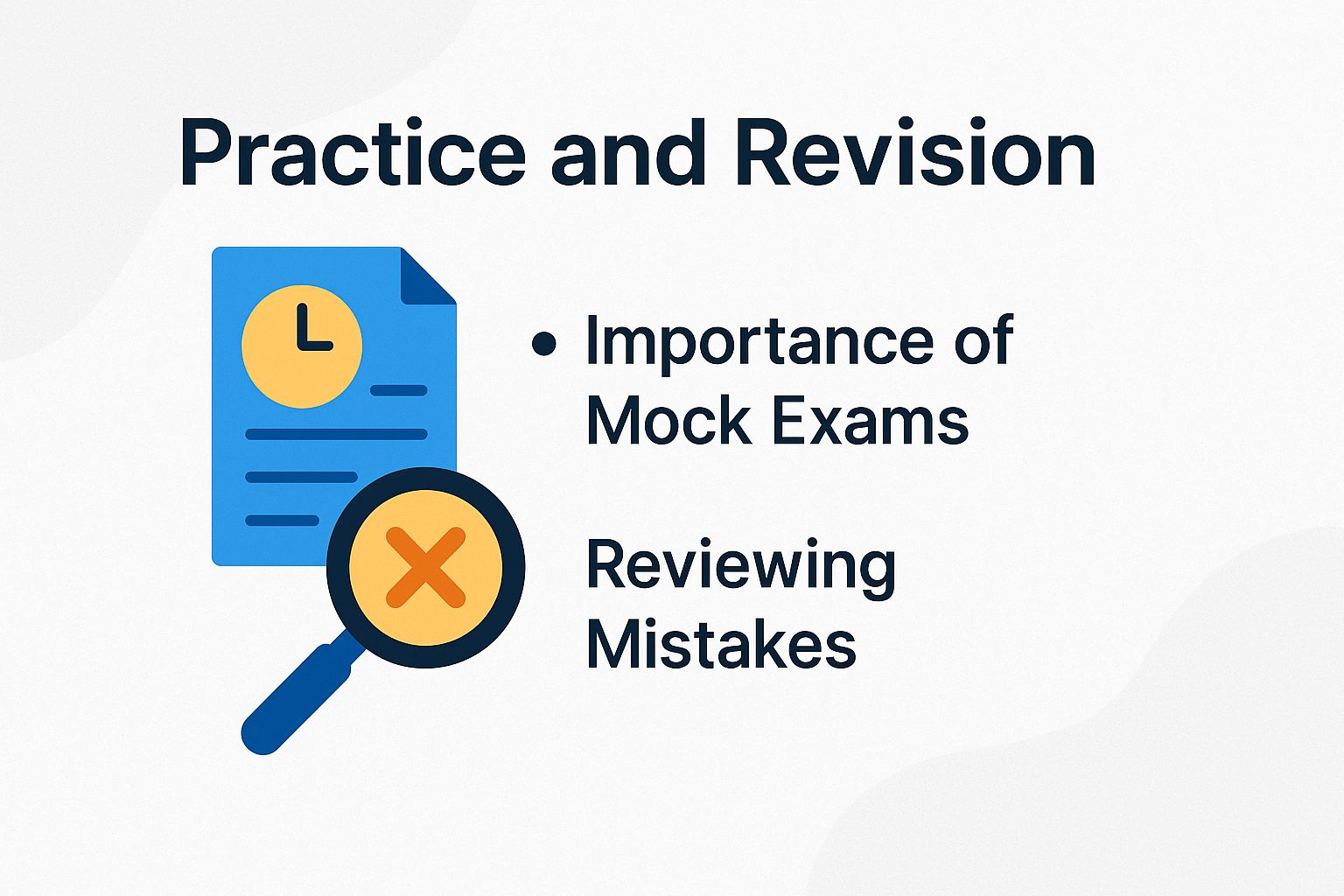
Effective practice and revision are crucial elements of a successful GL 11 Plus preparation. They help students become familiar with the exam structure and the various types of questions they may encounter.
Importance of Mock Exams
Taking mock examinations can effectively replicate real examination conditions, helping students to build confidence and identify areas that require improvement before the GL 11 Plus Examination.
To create effective mock examinations, it is advisable to begin by sourcing past papers or practice tests from reputable educational websites such as EdPlace or 11PlusFoil. Scheduling these mock examinations at times that align with the actual test will contribute to a more realistic setting.
It’s beneficial to start with easier papers and gradually increase the difficulty over several weeks. For instance, one might begin with a 40-minute paper before progressing to a full 1-hour examination to closely reflect actual conditions.
After the mock examinations, it is important to encourage review sessions to analyse mistakes and reinforce learning. This approach not only enhances knowledge retention but also helps to alleviate anxiety on examination day.
Reviewing Mistakes
Reviewing mistakes made in practice tests is essential, as it offers valuable insights into knowledge gaps and aids in refining exam-taking strategies. To analyse these mistakes effectively, it is helpful to maintain a mistake log where you can document each error, the type of question, and the reasoning behind the mistake.
It is beneficial to categorise errors by subject or type of question, such as vocabulary, comprehension, or quantitative reasoning. For instance, if you frequently encounter errors in vocabulary, you might consider using apps like Quizlet to reinforce your learning in that area.
Additionally, reviewing explanations for each mistake found in practice test materials can significantly enhance your understanding. By adopting this systematic approach, you will be able to track your progress and concentrate your study sessions on the areas that need improvement.
Test Day Preparation
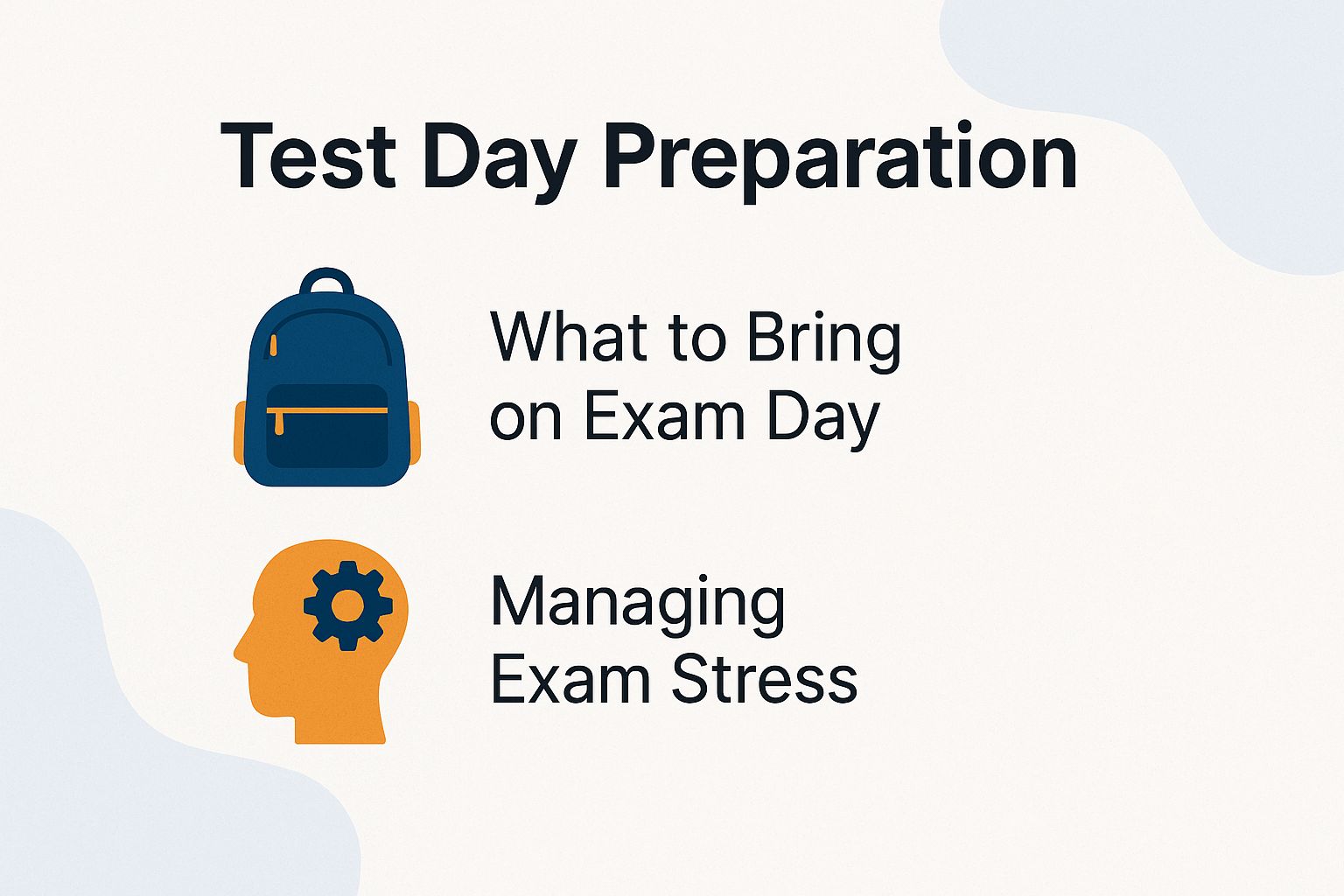
Adequate preparation for test day can greatly impact performance, helping students feel both ready and confident as they approach the GL 11 Plus Exam. One of our hidden gems is an article with 11+ comprehension tips that can aid in boosting your child’s performance in English exams.
What to Bring on Exam Day
Students are encouraged to create a checklist of essential items to bring on exam day, including identification, stationery, and water, in order to minimise stress. Here are some key items to include in your checklist:
A valid photo ID, such as a student card or driving licence
Writing implements, including pens, pencils, and an eraser
A water bottle to stay hydrated
Any necessary calculators or approved reference materials
It may also be beneficial to pack a watch to help manage your time during the exam. Preparing these items the night before can further alleviate anxiety and ensure that you are ready to concentrate on the test, providing you with peace of mind as you enter the exam room.
Managing Exam Stress
Implementing stress management techniques, such as deep breathing and visualisation, can be highly beneficial for students seeking to maintain composure during the GL 11 Plus Exam. Additionally, students may find that progressive muscle relaxation enhances these techniques; this involves tensing and then relaxing each muscle group for a few minutes.
Establishing a pre-exam routine can also prove advantageous. For instance, dedicating the last 20 minutes before the exam to review key concepts may significantly boost a student’s confidence. Utilising tools such as the Mindfulness app for guided meditation can further support their preparation.
On the day of the exam, visualising a calm and successful test experience can give power to students, helping them approach their exams with a positive mindset.
Post-Exam Steps
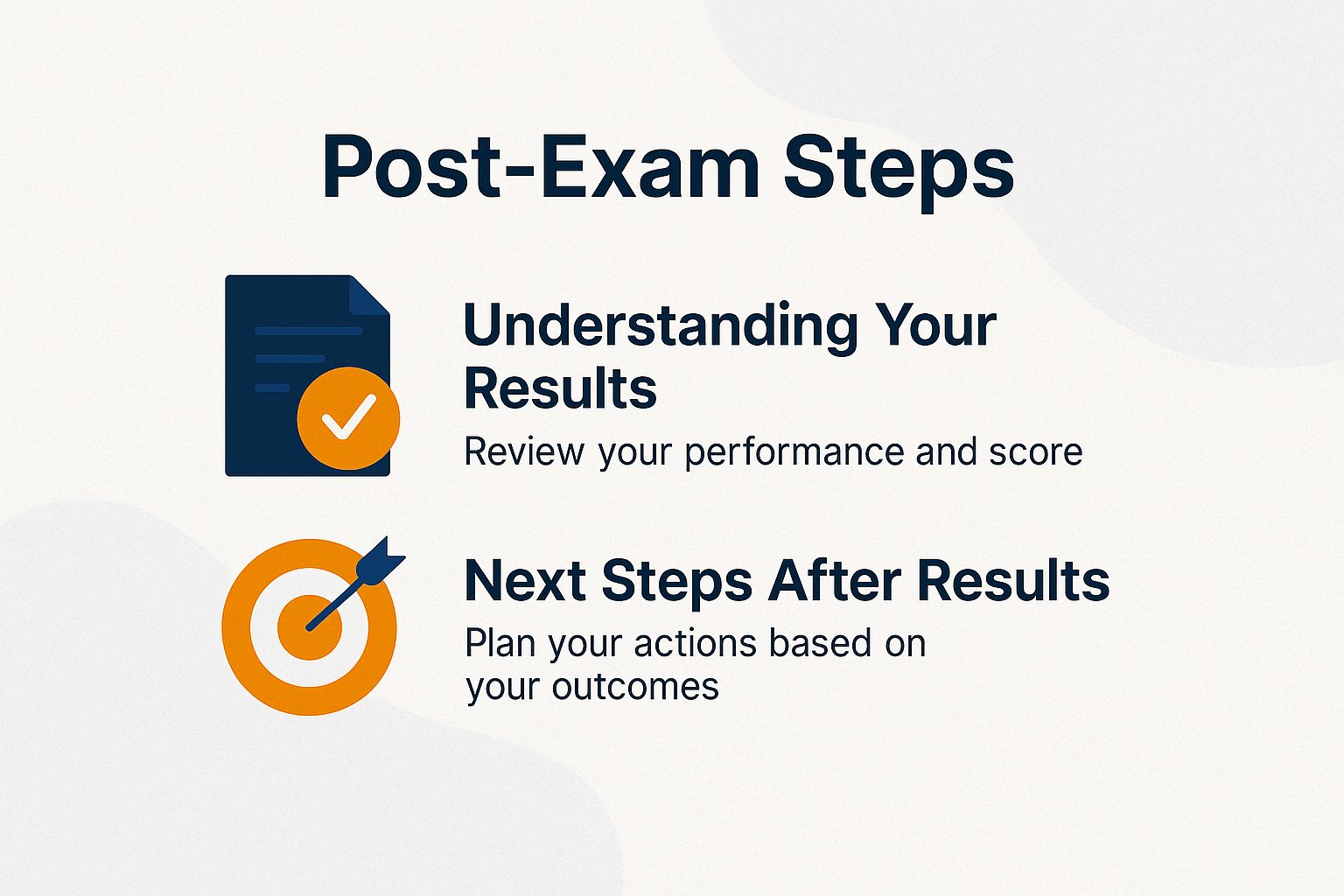
Post-exam reflection and analysis play a crucial role in understanding one’s performance and planning for future academic pursuits, especially after the GL 11 Plus Exam.
Taking the time to evaluate what worked well and what could be improved can provide valuable insights that guide future study strategies and goals.
Understanding Your Results
Understanding the GL 11 Plus Exam results necessitates a careful examination of various scoring metrics, including percentile ranks and raw scores, to accurately assess performance. To interpret these results effectively, it is important to concentrate on three key aspects:
Percentile ranks indicate how well your child performed in comparison to their peers. For instance, a 75th percentile rank signifies that they outperformed 75% of the test-takers.
Raw scores reflect the total number of correct answers, providing insight into specific strengths and weaknesses.
If a student is facing challenges in maths, it may be beneficial to consider enrolling them in specialised tutoring programmes or utilising online resources like Khan Academy for targeted practice.
Additionally, conducting regular assessments will be instrumental in tracking progress and adjusting strategies as necessary.
Next Steps After Results
After receiving their results, students should thoughtfully evaluate their options based on their performance, which may include pursuing advanced study programmes or entering a secondary school.
One possibility is to enrol in a secondary school that offers programmes tailored to the student’s interests, such as science or the arts. Alternatively, if students are close to meeting the requirements for their desired path, they might consider retaking their exams to improve their scores.
Additionally, seeking academic support through tutoring or study groups can significantly enhance their understanding of challenging subjects. Each decision should be a reflection of the student’s strengths and future aspirations, ultimately allowing for a more personalised educational journey.
Frequently Asked Questions
What is the GL 11 Plus Exam?
The GL Assessment 11 Plus Exam is one of the main tests taken by pupils in Year 6, usually at age 10 or 11. It is used by many grammar schools to assess skills in English, maths, verbal and non-verbal reasoning. Some areas instead use the CEM 11 Plus Exam, while a few schools set their own papers or follow the ISEB Pre-Test. Always check which exam board your chosen school uses before preparing.
When should I start preparing for the GL 11 Plus Exam?
It is recommended to start preparing for the GL 11 Plus Exam at least one year in advance. This will allow enough time for thorough preparation and practice.
What subjects are covered in the GL 11 Plus Exam?
The GL 11 Plus Exam tests a student’s knowledge in English, mathematics, verbal reasoning, and non-verbal reasoning. It is important to prepare for all these subjects in order to do well on the exam.
What are some effective ways to prepare for the GL 11 Plus Exam?
Some effective ways to prepare for the GL 11 Plus Exam include practising past papers, enrolling in a preparation course, using online resources, and working with a tutor.
How can I improve my performance on the GL 11 Plus Exam?
To improve your performance on the GL 11 Plus Exam, it is important to practise regularly, identify and work on your weak areas, and manage your time effectively during the exam. You can also seek guidance from teachers or tutors to help you improve.
What should I do on the day of the GL 11 Plus Exam?
On the day of the exam, make sure to get a good night’s sleep and have a healthy breakfast. Arrive at the exam centre early and make sure to bring all necessary materials, such as pens, pencils, and a calculator. Stay calm and focused during the exam and try your best. After the exam, avoid discussing it with others to prevent unnecessary stress.


